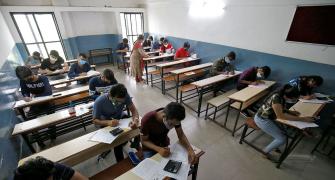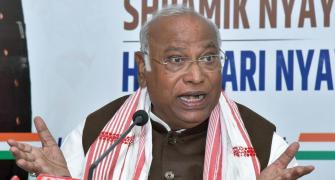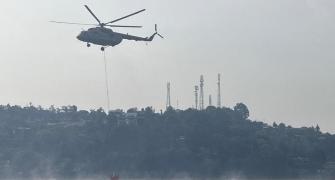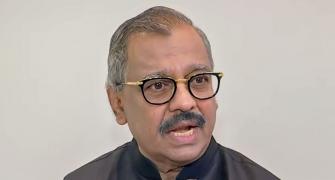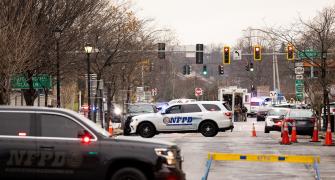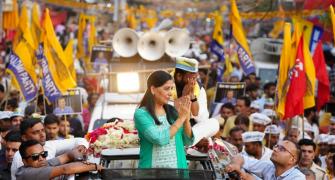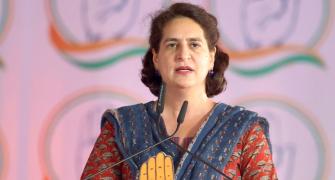The United States Congressional legislation came as the icing on the cake, concretising the nuclear deal with India that stood out as an outstanding success for New Delhi's diplomacy in the year that went by, notwithstanding reservations from the Left and the Right of the political spectrum and nuclear scientists.
The year 2006, however, saw the threat of a major setback to the improving ties with Pakistan after the deadly July 11 Mumbai blasts blamed on elements across the border.
As the year progressed, the situation on the Pakistan front was resurrected with some mature diplomatic maneuvers resulting in the resumption of bilateral composite dialogue and setting up of a joint working group on battling terrorism.
While the Indo-Pak relations hogged limelight for about five months, the external affairs ministry remained pre-occupied throughout the year with the civilian nuclear deal with the US. The agreement, initiated on July 18 last year and concluded on March 2 this year during the visit of President George W Bush, was translated into law earlier this month.
Ending India's 30-year-old isolation in the nuclear field, the development is billed as one that will transform the relations between the two countries. The process has not been smooth, however, as controversies have accompanied the deal, with both Left allies and the Opposition accusing the Congress-led government of 'mortgaging' the country's sovereignty.
Even the final bill, which was signed into law by Bush on December 18, contains certain elements that are seen with concern in India. Even the government has acknowledged this fact and Prime Minister Manmohan Singh conveyed this to Bush during a telephone conversation on December 21.
The process of establishing the cooperation has not, however, been completed as the two countries will now have to negotiate a separate pact -- 123 agreement -- to operationalise the civilian nuclear deal. India hopes its concerns will be addressed in that agreement.
Besides, New Delhi also has to negotiate a safeguards agreement with International Atomic Energy Agency and wait for 45-nation Nuclear Suppliers Group to amend its guidelines to allow international community to have nuclear cooperation with India.
As pre-occupation with the nuclear deal continued, relations with Pakistan, which had been improving over the past two years, witnessed a setback after terrorists struck in Mumbai on July 11 by carrying out serial train blasts. Nearly 200 people were killed and over 800 injured in the peak office hour explosions in local trains in the commercial capital and security agencies pointed accusing fingers at ISI and Pakistan-based terror group Lashker-e-Tayiba.
A war of words ensued between the two countries coupled with huge public outrage. In the midst of this, India indefinitely postponed the foreign secretary-level talks slated for July 20.
The relations witnessed yet another cold spell before the prime minister and Pakistan President Pervez Musharraf met in Havana on the sidelines of the Non Aligned Movement Summit in September. The two leaders decided to set up a joint mechanism to fight terrorism and agreed to resumption of Foreign Secretary-level talks. This led to easing of tensions.
Another neighbour, Nepal, was on the boil as a popular movement gained momentum for restoration of democracy, which was suspended by King Gyanendra in February last year. This posed a major challenge for India in terms of foreign policy as Nepal depends on the closest neighbour for almost everything.
India was faced with a precarious situation as traditionally it has advocated twin-pillar system -- Constitutional monarchy and democratic government -- in Nepal. However, this time, one pillar -- democratic forces had risen in revolt against the other pillar -- the monarchy.
New Delhi engaged in back-channel diplomatic maneuvers resulting in King Gyanendra giving up his control on power and paving the way for formation of a democratic government. In the churning, Maoists, who have been fighting against the system for over a decade, also joined the mainstream.
Concerns also persisted in New Delhi over the situation in Sri Lanka, which continued to worsen during the year.
There was, however, immensely stepped up engagement with the countries across the globe. Significant among these were China, Britain, European Union, Japan, Brazil, Germany, South Africa and other countries of the African continent.
Chinese President Hu Jintao undertook a landmark visit to New Delhi last month reflecting growth in the bilateral ties. During the visit, the two sides agreed to take a slew of measures to improve ties.
But the visit was preceded by a controversy caused by Chinese Ambassador Sun Yuxi's statement that Beijing considers entire Arunachal Pradesh as part of his country. This led to uproar in the political and other circles but tempers have subsided lately.
The year also saw another significant visit, that of Saudi King who was the chief guest at Republic Day. Along with incoming visits by heads of state or government and other leaders from various countries, Prime Minister Manmohan Singh also travelled to several nations like United Kingdom Germany, Finland, Russia, South Africa and Japan. Strengthening ties in the field of business was the dominant theme of these visits.
The trend is expected to continue in 2007.

